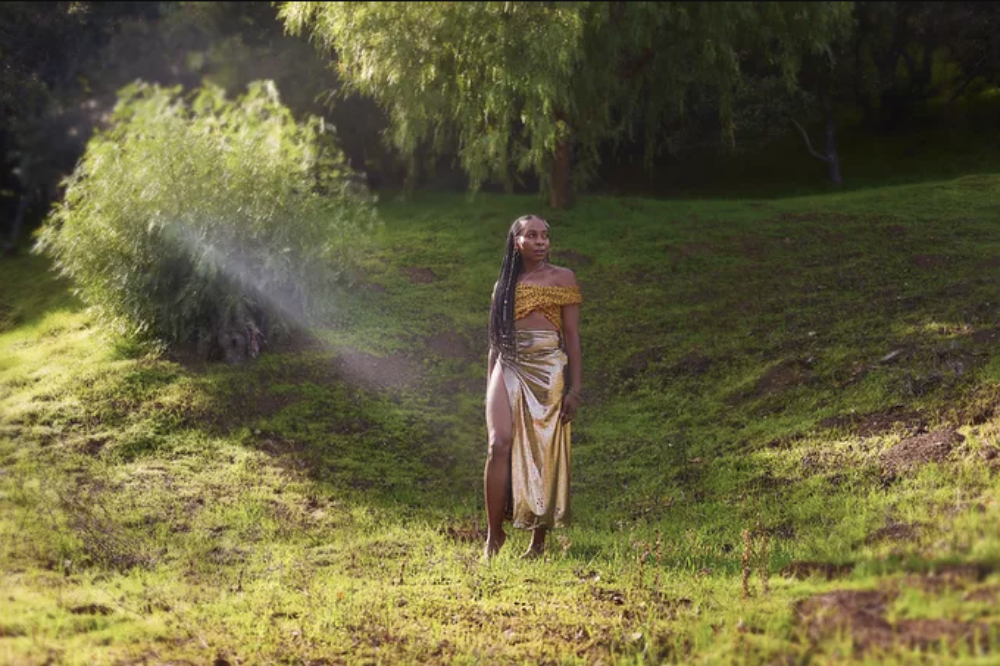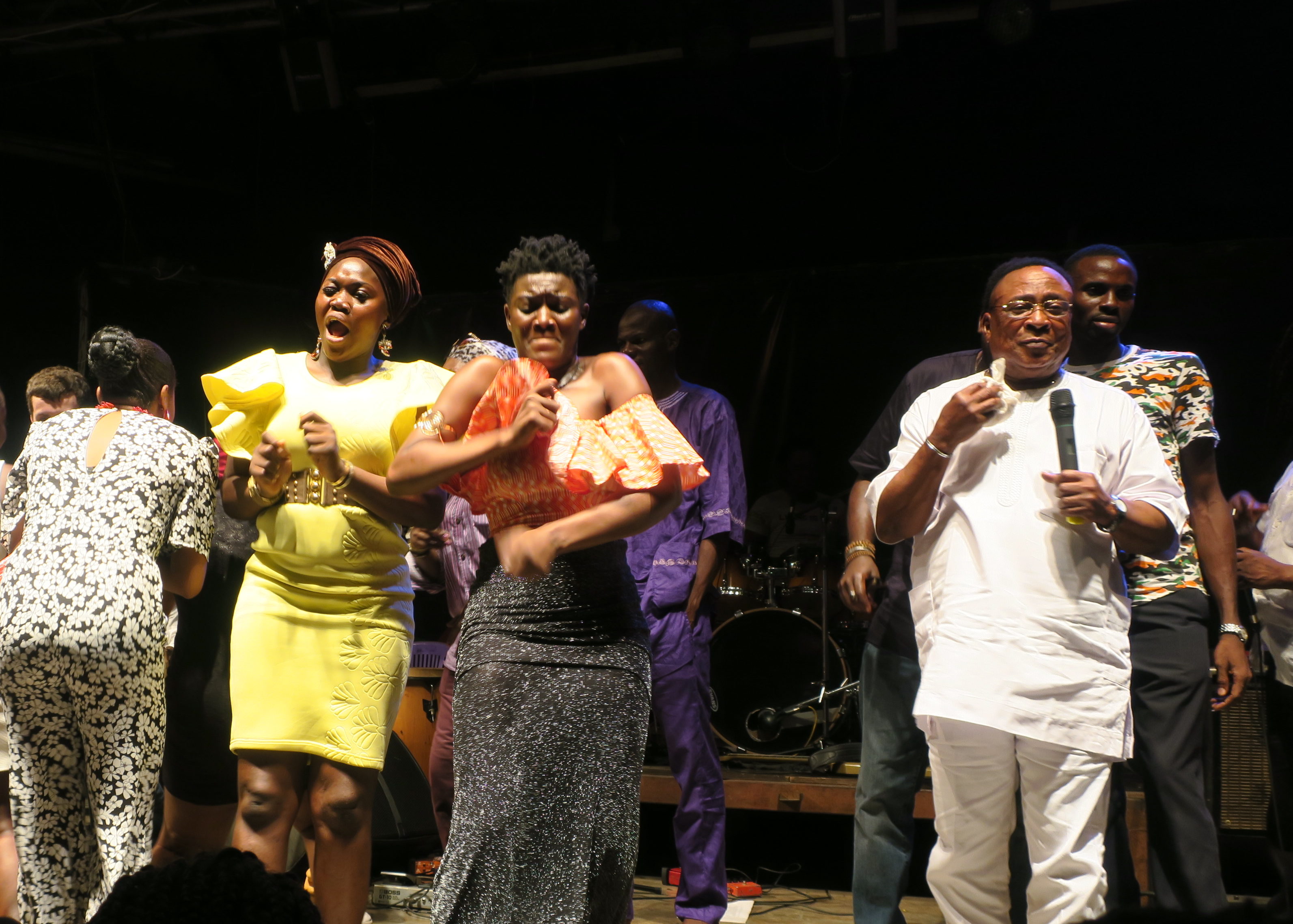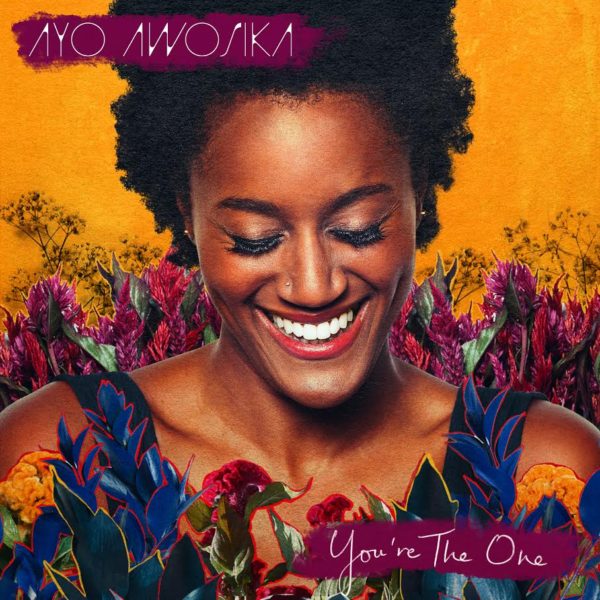
There’s an arc that every artist faces when producing new work—the spark of the new idea, maybe the first pass can have that rush, almost like falling in love, but then the work continues. And when it’s all out in the open, when the piece is out there on the table, or nearing completion, doubt can set in.
Nigerian-American singer-songwriter Mary Akpa faced this down as she put together her latest work, and in a way, her relationship to the songs became part of them—the context turned text, or maybe vice versa. One has to face themselves just like they face their work, and love for either has to come from a place of truth.
It sounds a bit heady, but it makes sense once you hear the song. In a chat with Afropop’s Ben Richmond, Akpa talked about her intercontinental process, writing in English and in Igbo, her non-negotiable love of guitars, and the layered translations of the title of her new single, “A Hurum Gi N’anya.”
Hit play, and read on.
Ben Richmond: Well, we should start with an introduction to the Afropop audience—do you want to introduce yourself—who you are and what it is you do?
I'm Mary Akpa, I'm a singer-songwriter—creative being, I guess? Born in Nigeria, raised in Southern California, so I'm a West Coast girl through and through. I love bodies of water and nature and anything that feels West Coast and breezy. [Laughs]. So yeah, that's me.
Very cool! And you just released a new song last month, “A Hurum Gi N’anya”—forgive my pronunciation.
That was close though! Good try good try!
Just took it from the song! If I go by my ears I can attempt Igbo. Do you want to talk about the song and introduce it to people?
“A Hurum Gi N’anya” means "I love you" in Igbo—well, that's kind of the flat meaning. It's a song that, of all the songs I've written, it has brought me back to myself. It's a song that I wrote as a reminder to really see anybody myself and to not look away from even the shadows and things about myself I may not love. So, I chose to keep the Igbo title, because I originally intended to translate it to English. But the cool thing about Igbo—and I find this in a lot of West African languages, at least the ones I'm familiar with—is that they're almost parabolic, meaning, there are very few direct translations. You understand something in the context and way that it's said, and so “A Hurum Gi N’anya” actually translates closer to like, "I see you eye to eye," which is such a deeper way of loving.
And I always felt that growing up. My mom, we spoke Igbo and English and sometimes it's just A hurum gi n’anya and sometimes she would say "I love you" and the "I love you" felt kind of basic. And that stuck with me, that feeling of the weight of what it means to really see yourself eye-to-eye first before you can see anyone else or love anyone else—so I just kept the tongue-twister title and just walk people through it. Which is why in the video I'm giving a mini-lesson to folks in my community so they don't have to stumble so much with the pronunciation.
And you speak those two languages comfortably?
I don't speak Igbo fluently anymore. I understand it perfectly and I'm trying to build back up to speaking it fluently but it is my native language. So Igbo and English for now, hopefully I'm going to be adding some other things as I grow.
In the biggest pop music in Nigeria, Afrobeats, they switch amongst languages totally comfortably and I noticed on your songs as well, you will use either language for a hook or lyric. You mentioned having another language gives you other shades of meaning, is it liberating being able to switch between them?
I've never thought of it that way as liberating. Maybe. It's funny I only think of certain things in Igbo, again because I'm not fluent yet. It's weird. There are certain things that, when I try to say it in English, it doesn't feel like I'm saying the same thing. So maybe yes. But also the funny thing is, Igbo mix Igbo and English quite a bit. So even growing up my mom would say things like "nweta m nke ahu pan"—"get me that pan," but pan is not in Igbo. It's in English. So I grew up hearing that mingling mostly Igbo with a few English words here and there. And I think it's because sometimes there isn't an equivalent or the equivalent word in Igbo would make it too long or something, so they just use the English word. I don't know what that is. So I think that's why you find a lot of Nigerian artists that will switch. And just throw a little pidgin word in there or a little Yoruba whatever they speak. It's the way languages are spoken because English is the national language of Nigeria, so most people do speak English and then their native language.
Are you playing guitar in these tracks as well?
I actually am not playing guitar. There are three guitar players playing on these tracks. It's part of my journey of being able to call myself a songwriter and composer. Because I hear guitar melodies, it's the first thing that comes to me, but I don't play guitar very well. I'm actually still to this day trying to teach myself rhythm guitar. So I don't have the confidence to come out and play these lines and oftentimes the lines I hear are quite difficult! So I collaborate mostly with guitar players. And it's important for me to collaborate with people that can interpret my ideas. I just kind of sing them a line, and say "Oh now you play that and you play that— O.K., what if we switched this, what if you played two beats late? Oh, hold up come in now,” that's kind of how I move the parts.
That's an interesting process because it comes out sounding definitely West African but there's something about the guitar tones on the track that almost sounds like Jackson Browne on those old Nico recordings, like "These Days" or something like that. Really forward.
Probably because that's my process. I just love guitars. Like LOVE guitars. It's crazy. When I play live I always have two guitar players at least. And I will forgo keys for guitar. ’Cause I feel like I would rather have the [guitar] lines that have that syncopated movement and leave a little bit of open space that the keys would normally fill then not have that. If I can't get keys, it's like “O.K., but I have the two guitar players,” but I knew that one I needed to record in Nigeria, and I knew I needed Nigerian musicians just because I wouldn't have to over-explain the feel of things. And I knew I needed three guitar players. I'm going to go here, record something I know I need my people in place at least I can just get these ideas to flow without being like, "Oh I can't play this other part" and slowing things down.
Do you always record in Nigeria? Was that the song "That Day on the Train" from the same sessions?
That was actually from my last EP from gosh, 2016? My goodness. This album was mostly recorded in Nigeria. I started collecting ideas here and got together with a few longtime collaborators and it just wasn't clicking. No offense to them; it just wasn't the right time. I know now, on the other side of the process, that I needed to be home to do that. It was more spirit and confidence I feel when I'm home. Things just flowed out of me differently than they would have here, I know that now for a fact. So we set up a studio and locked ourselves in this house for six or seven days and just pumped out ideas and we were all on a high, like, "this is the most amazing thing ever." And then came back to the U.S. and just kind of lost it. I just started questioning everything like "is this good? Do I need to redo this? Redo that? Redo that?" So it started in Nigeria and came to Brooklyn, I got more frustrated and came home to California and then came back to Brooklyn. So it's traveled quite a bit, this project.
When you've got that spark it feels like you could never lose it and then when it's not there, it's like “did I ever have that?”
Yeah, that was such a part of the experience. It really was depressing! I feel like had I been in Nigeria longer I definitely would have finished the album sooner. But, I would not have gained the insight and I would not be the artist I am now if it did not take me so long. And here's why: that process where you get the ideas out and start questioning them, that questioning been the premise of my career. I was signed at 19 so I had been an artist for years at this point the most of it has been that for me like, "do I sound good? Should I change this? Should I change the guitar? Oh, other artists sounds like this—can I make this cooler?" That's been me this whole time, my whole career. I don't know if it was the timing of it or what, but I needed the force or push of being brought so close to how much I criticize myself to see that that was spilling over in every area of my life. And that was really the journey of this project. It brought me back to myself in a way I could never have imagined. I'm so grateful for it even if it gets zero love because I needed that. I needed to be like, "wait so all this time you've been giving away production credits, songwriting credits, all of this away because you didn't feel like a songwriter? Well, you wrote the song!" That kind of thing, where it's like "you don't even see yourself!"
What pulled me out of it was, last year when Ahmaud Arbery was murdered for running while black, one of the songs on the album is called "Black Body." I released it in July of last year. Oftentimes when I'm recording and I play a show I throw in a song I haven't released just to kind of see how it feels in the body. I love being on stage and that gives me the most clues—how does it sound when you're actually playing it? So I played "Black Body" four or five times over two years, and when Ahmaud Arbery was murdered I was getting messages from people: friends who had come to shows, people on Soundcloud asking randomly or people in my mailing list, who said they wanted to hear that song. And I was with my sister and she just gave me a heart to heart, she said, "Mary, you have a whole album of music that you're not releasing because you want to make it better. What if you just kept it as is and just released this one song? And see what happens?" And that was the beginning of me coming back and re-listening two things and listening again to “A Hurum Gi N’anya” and asking myself what it was I wanted to change. That's what was holding me up. Feeling like I needed to write it better, or make it sound better, or making it sound like some type of songs instead of just letting it be what it was. So a lot of the songs reverted back to what they were. [Laughs].
In a way, that's just kind of a waste of time! There's a line in the song "never thought I'd find the beauty in the mole above the right side of your face." And when I sang that we were just still locking in the vibe and I just mumble-sing stuff. I was just like " I'm going to find a really cool way or visual metaphor to talk about something that you don't like but something that everyone can identify with." And I remember I really good songwriter friend of mine saying, "Why can't you just say what you just said?" And I was just like "But to me...." It was just that kind of stuff bogging things down.
So when did you get lyrics wrapped up to your satisfaction—as much as anyone can have that?
October was the first time I went back in the fuller project after releasing "Black Body" in July. And I listened to it and I said O.K. Mary, really what do you need to rewrite? I actually didn't change anything. The only thing I added were the "Oos" in the background.
A friend of mine, a collaborator who was actually playing guitar on the song, Carey Clayton, he actually came to Nigeria with me. We have been playing together for a long time and he's heard me talk about this Nigerian band so much and he was just like, "but you don't know how to setup a home studio"—because I didn't—"I can come and help you and just play on the album." He had been reaching out to me to over the years saying "You got to get out of your head with this project." So when I got to working on “A Hurum Gi N’anya,” he happened to be in a mobile studio in Tahoe, and was like "Listen, if you can get here, I've got five days free we can just listen to everything, clean it up and send it to mix. But you have got to be O.K. leaving everything as it is." So I hopped on a plane in the middle of the pandemic and knocked out the last little bits of the album but was pretty much keeping everything as the same. We literally went back to the original files. Because there were other passes, but we went back to the original. It's just so ironic to me.
This process and you yourself are intercontinental—do you find that with Nigerian music gaining popularity in the United States people are understanding your use of Igbo as a language?
That's an interesting question. I'm so glad the people are becoming more familiarized with Nigeria and Nigerian music and Nigerian sounds because I feel like it was just a matter of time. What more feel-good music can there be? It's beautiful to watch. But I don't know if that's familiarizes people with me per se, because I'm not your typical Nigerian artist. I've been speaking with other media platforms in Nigeria and it's a question I get all the time, "So Nigerians want to know when you're going to make an Afropop album?" Because Nigerians like to have a good time; they like to dance and if you're not facilitating that in your music, they kind of don't know what to do with that. You're called alté all of a sudden. I don't fit into the category of music that would popularize me with the general public because I don't fit into the “Afropop” category.
But I do think that and hope that what comes from this it's just a familiarization with Nigerian artists in general. My biggest influence from Nigerian music is what I grew up on and it wasn't Afrobeat. I grew up on juju, on highlife, on these old singers, King Sunny Ade, not necessarily Fela, although we listened to Fela. It's not the only form, but I think Afrobeats is so popular and now Afrobeats that people now think, Oh that's what Nigerian music is and it's like, "Oh, but that's only a small fraction."
We should get the practical and particulars out: Is it coming out on a label when it is coming out? Any performances of any kind coming up?
Oh COVID, COVID. So many plans just washed away. But I'm working on a virtual thing, hopefully I can coordinate it with my band in Nigeria. The wheels are moving it's getting there. The album is going to be released independently in the spring.
It is it going to be an all-digital release?
Well on the low [REDACTED]....(laughs).
Well, congrats on coming to something that you—rightfully—should be proud of! I mean, I liked it right away but I understand if you're a little too close... Is there anything else the Afropop audience should know?
Yeah! I like to say this because as much as the song is a reminder to myself and affirmation to myself not to look away for myself, I really hope that people take that message for themselves as well. We look away from ourselves and turn away from ourselves so much and our lives, you know to get the right job to get someone to love us to fit into a particular whatever. It's really liberating to just see yourself to literally see yourself and body yourself. Know the good and the bad of you: That's the best thing you can do for yourself because you can't really give anything that's authentic and true to yourself if you're not doing that. So I really hope the song puts that somehow in people's minds. And if it doesn’t, I just said it!










